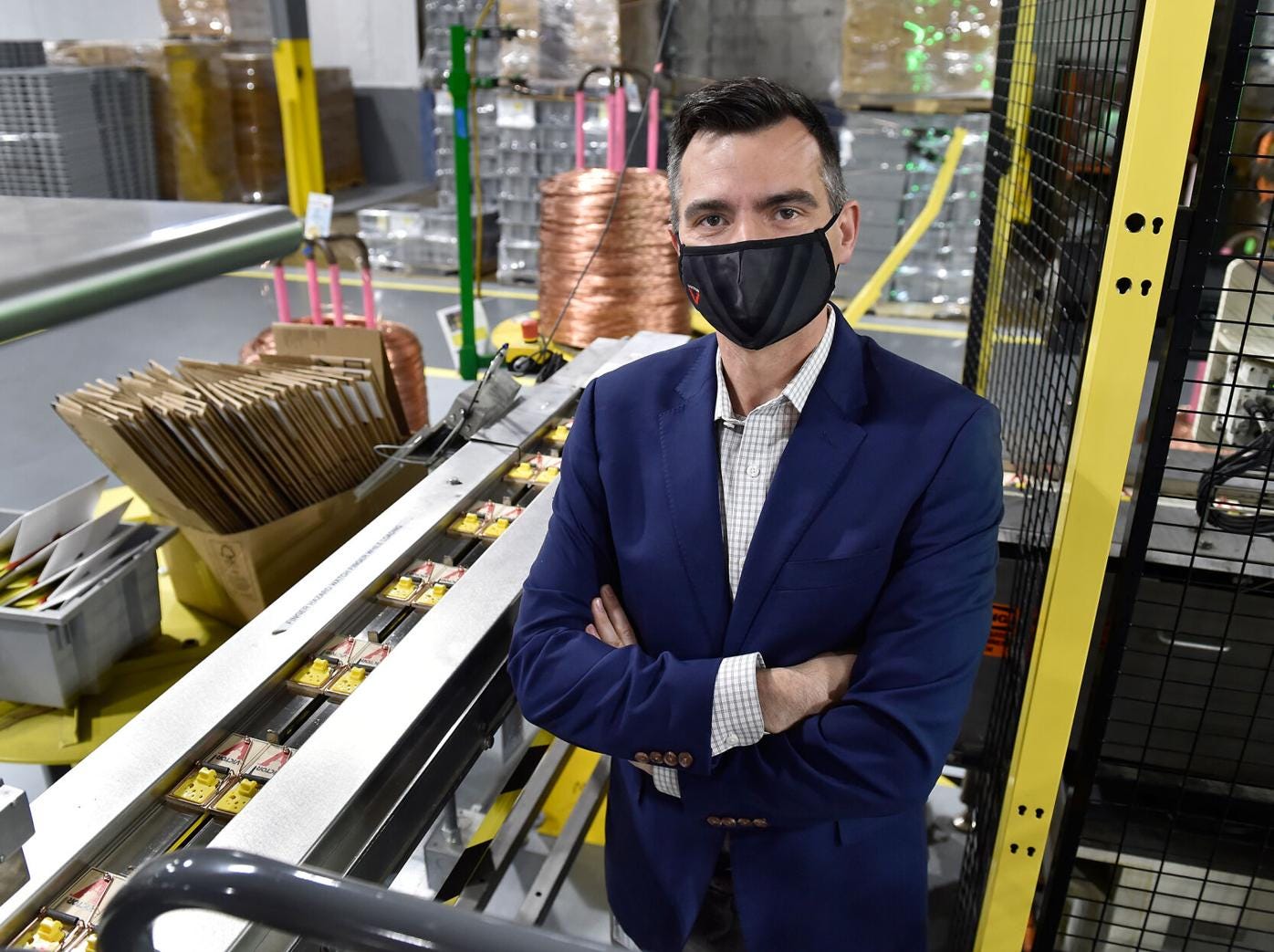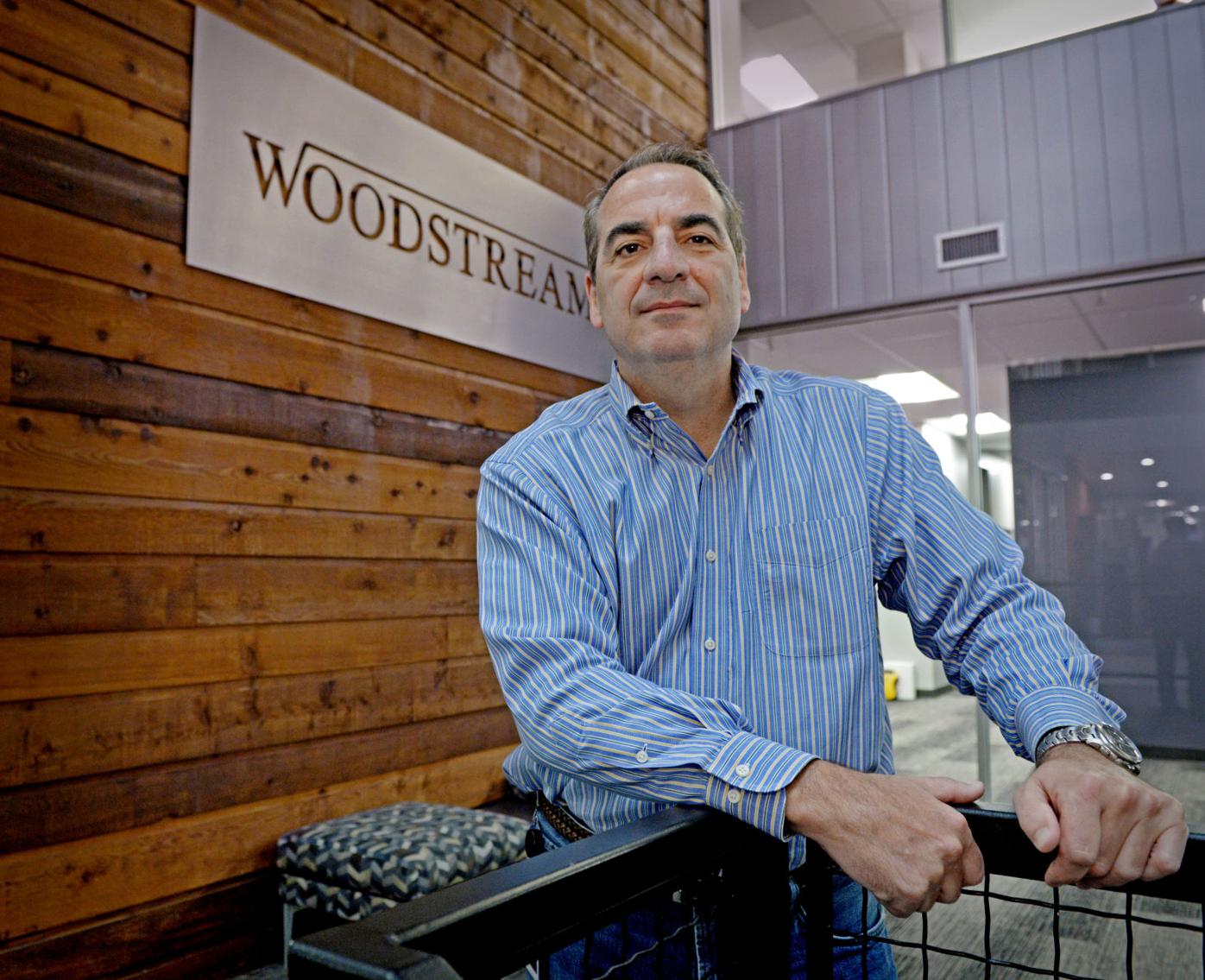Woodstream's revenue, employee wages skyrocket amid pandemic as birding, animal control products are high in demand
Featured on Lancaster Newspaper, April 25, 2021

Boris Bajlovic, vice president of the Victor business unit at Woodstream, is pictured by the line that manufactures wooden mousetraps at Woodstream’s Lititz plant on Wednesday, April 21, 2021.
When a company’s employees give extraordinary effort to meet extraordinary demand from its customers, here’s the result: record revenue.
That’s the equation at Woodstream Corp., the Lancaster-based manufacturer of mouse traps, ant bait, bird feeders and a host of other products.
The deluge of orders stems from the COVID-19 pandemic, which is forcing millions of Americans to work, eat and relax at home more than ever. These increased activities can attract insects or rodents, and lead to new hobbies such as bird watching, explained Woodstream CEO Miguel Nistal.
“Demand has gone through the roof,” he said.
The daunting challenge of filling the unprecedented volume of orders during the pandemic is falling largely on the company’s hourly employees in its factories and distribution centers, according to Nistal.
The employees are meeting that challenge, resulting in a 25% jump in revenue last year and an expected 20% rise in revenue this year. Woodstream in turn is recognizing their invaluable contribution — and motivating the workers to keep it up — with an array of raises, bonuses and other measures.

Woodstream President & CEO Miguel Nistal
A national leader with six main brands in pest and animal control products, birding products and electric fencing for farm-animal containment, Woodstream’s niches are among several industries to be flooded with work because of the pandemic, joining the supermarket, drug store, e-commerce and other industries.
Many businesses in those sectors are coping with strains on their work forces, as well as pressure on their supply chains. The workforce stress is compounded by a struggle to fill vacant or new positions. That makes retaining employees more important than ever.
As a result, Woodstream is doing more than just saying it appreciates the efforts of its factory and distribution center employees. It’s tangibly demonstrating that gratitude, a strategy which Nistal believes has “definitely helped” its employee retention.
Grasping the distinction
As Nistal points out, employees in Woodstream’s factories and distribution centers face a whole different set of workplace issues during the COVID-19 outbreak than employees in offices, like himself.
“Miguel Nistal comes to work and I’m safe because I’m sitting (alone) in an office,” he said. “My manufacturing guy making mousetraps doesn’t get that benefit, so he should get more money. I should give him something. I’m grateful for that person.” Office employees also have the option of working remotely.
Woodstream’s initiatives include giving the factory and distribution center employees a raise of $2 an hour last year, paying a pair of $500 bonuses to them last year, and planning to pay the same-size bonuses this year.
Company wide, Woodstream last year boosted minimum pay to $15 an hour, a substantial increase from the $10 to $12 most employees got when hired. It’s also giving $300 rewards to employees who get vaccinated, plus providing help with scheduling the shots and a vacation day for getting them.
On top of that, it paid employees for vacation time that went unused due to work demands or other reasons.
“At times like this,” Nistal said, “when work becomes difficult, and it’s more of a burden than a joy, it’s important to give employees incentives to bear through it. Maybe a little bit of financial aid helps the burden be a little smaller."
Thinking fast
Woodstream’s response to the pandemic took shape quickly in March 2020, when COVID-19 arrived.
The company closed its plants and distribution centers for a week while it planned its next steps. Designated a critical business by Gov. Tom Wolf, Woodstream was allowed to operate its plants and distribution centers while businesses deemed non-essential had to close facilities.
“(Our executive team) sat down and said, ‘With every issue that we face, how do we make sure our hourly employees come back to work and stay protected? How do we reward them, because they’re going above and beyond the call of duty?’” said Nistal.
“So we brainstormed those ideas. We looked at what some of the global corporations were doing as well. We said, ‘There’s no reason why we can’t do as much or more for our employees as the global corporations are doing,’” he added.
Now, more than a year into operating during the pandemic, Nistal said, “I’m really proud of what we’ve done at Woodstream. We’re on par with what Walmart has done, what Target has done, what Amazon has done, yet we’re a small Lancaster County employer.”
The extra compensation, which he said totals “several millions of dollars,” is money well spent, in his view.
Even with the extra expense, the company’s financial results are “very good … and it is important we reward and take care of our employees, who are the reason we are so successful,” Nistal said.
Nistal declined to specify how high Woodstream’s annual revenues surged in 2020, except to say they exceeded $500 million. As a privately held company, Woodstream is not obligated to make public its revenues and profits.
Another case of money well spent was the expense of getting personal protective equipment (PPE) such as masks and gloves, as well as having barriers installed between work stations in the factories and distribution centers. Woodstream had the materials delivered by air-freight during that one-week planning hiatus.
The company also hired a cleaning crew that’s sanitizing the common areas of the facilities, such as lunchrooms and bathrooms, during every shift. Employees sanitize their own work stations.
“They’re definitely ahead of the curve on this thing, both with PPE and incentives. … They’ve done a really good job of managing through the whole pandemic,” said Mike Wentzel, president of International Association of Machinists' Local 2906, which represents about 190 hourly workers at the Lititz plant.
Nistal is making a pointed effort to keep employees informed and appreciated during these unique times. Beginning in March 2020, he’s been giving business updates every six weeks to all employees via Zoom, and hosting round table conversations with groups of 10 employees every two weeks via Zoom too.
One recent topic was the kickoff of a new emphasis on environmental sustainability and corporate governance. Goals include reducing waste, shrinking the carbon footprint, being a more inclusive and diverse workforce, and giving back to more to the community. Woodstream will be hiring a vice president in charge of the effort.
A new normal
Nistal, who leads a company that has local roots dating to 1896, is optimistic that the 2020 surge in revenue is not a once-and-done fluke. “We actually think it’s going to be sustained. A significant portion of this increased demand are new consumers to the category, meaning they did not purchase the product before,” he said.
Why is that important?
Nistal replied, “We’re in categories which are considered very sticky, meaning when the consumer experiences our product, they stay with it. Whenever we can convert a customer or obtain a new customer, they have a tendency to stay with us …We continue to do what we do best: develop new products, get new customers and grow our business through organic growth as well as acquisition.”
Impressive as the 2020 rise in revenue was and 2021 expected increase in revenue is, Nistal said the upswings could have been 10 percentage points higher if not for shortages in manufacturing materials, shipping containers and transportation.
“Almost all commodities have been difficult to procure (and) when we do, they are at inflated prices,” Nistal said. “Trucking and shipping of all types — road, sea, air — are congested and in short supply.”
Also in short supply is manpower, a common lament among employers in many industries who are looking to hire.
In its Lititz plant and engineering center, where Woodstream employs a total of about 250 people, the company would like to hire more than 30 additional workers. At its downtown Lancaster headquarters, where Woodstream has about 200 employees, it would like to hire about 20 more.
Wentzel, the local union president, is happy to vouch for the upside of a job at Woodstream.
“There’s a good work environment here with tons of opportunities for people to come in and advance. You can absolutely do that,” said Wentzel, an electro-mechanical technician and 37-year employee. “It’s a good company.”
Woodstream's local roots date to 1896.
Woodstream's local roots date to 1896, when John M. Mast of Lancaster began making rodent traps.
Shortly, after the turn of the century, Mast moved the business to Lititz and formalized it under the name J.M. Mast Manufacturing Co. in 1901.
In 1923, Mast merged with the Oneida Corp. of New York to create the Animal Trap Co. of America.
The company asked the public to suggest a new name for the business in 1966, hoping for a name that would reflect its diversification into sporting goods. A Lutheran minister offered the winner: Woodstream.
Later, though, Woodstream divested its sporting goods businesses, which included hunting, fishing, skiing and golf equipment. The last was sold off in 1995.
